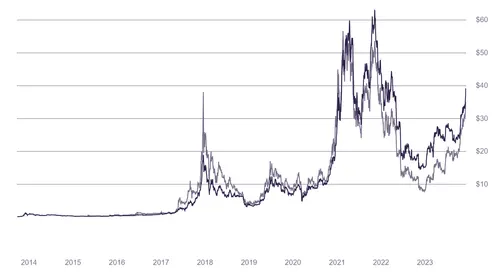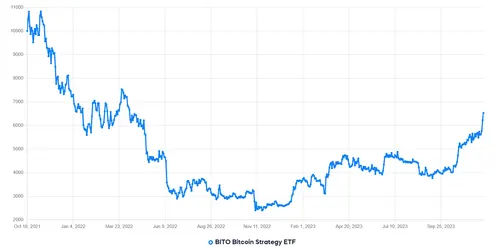Our partner, XM, lets you access a free demo account to apply your knowledge.
No hidden costs, no tricks.

Investing in Bitcoin has become more and more mainstream over the past decade, with even institutional investors adding the coin to their long-term portfolios today.
BTC is one of the most easily-accessible assets to invest in, as it can be accessed via numerous crypto exchanges. However, even for investors that do not have an account with a crypto exchange, BTC is still only an arm’s reach away.
Bitcoin ETFs have significantly grown in popularity, as they allow equity investors to easily buy and sell ETFs on major equity exchanges without the need for an additional crypto trading account.
BTC ETFs function similarly to any other exchange-traded fund that invests in a particular asset class - traders can buy and sell their shares on an exchange and orders are executed in a matter of seconds.
Investing in Bitcoin has never been easier, which has also affected the price of the coin, trading several multiples higher than it did even 5 years ago.
Before we dive deeper into the specific Bitcoin ETFs you can invest in, it is important to first understand how Bitcoin ETFs work and why they may be a good choice for stock traders.
Bitcoin ETFs are funds that invest in derivatives that track the performance of Bitcoin, without them directly owning the currency on their books. However, the SEC has long considered allowing ETFs to directly own Bitcoin outright, which would make the investment process much more straightforward.
This is a great way for equity investors to easily access the exposure to Bitcoin’s price movements and either take advantage of short-term price movements, or invest for the long haul.
Below we will look at a list of some of the most popular Bitcoin ETFs and how they gain exposure to the asset to better understand the differences between the numerous BTC ETFs that are available on the market today.

Grayscale is one of the few trusts that invest in BTC passively, allowing investors to gain exposure to the asset without the risks associated with safekeeping and active management.
The benchmark index for GBTC is the CoinDesk Bitcoin Price Index, or XBX.
The trust charges a management fee of 2% and was initially launched on September 25, 2013, before entering the OTC markets on April 5, 2015.
Grayscale is the single largest cryptocurrency asset manager in the world, with over $27 billion in AUM.

The ProsShares Bitcoin Strategy ETF, or BITO, was launched on October 18, 2021 and manages over $880 million in assets.
The fund has an expense ratio of 0.95% and does not track an underlying index. Instead, it invests in CME Bitcoin futures contracts and U.S. Treasury Bills.
BITO is one of the more volatile BTC ETFs on the market, making it more attractive for short-term traders.
The Global X Blockchain & Bitcoin Strategy ETF, or BITS, was launched on November 15, 2021 and manages over $18 million in assets, making it one of the smallest crypto ETFs on the market.
The fund’s holdings include the Global X Blockchain ETF (54.03%), Global X 1-3 Month T-Bill ETF (27.67%), and mutual funds (18.10%). BITS has an expense ratio of 0.65%.
It must be noted that since not all of BITS’ assets are invested in BTC-related assets, its correlation with the coin’s performance may vary.
As with any other investment, Bitcoin ETFs also come with their fair share of risks and opportunities that investors and traders need to carefully consider before making the move and committing their capital to BTC ETFs.
Our partner, XM, lets you access a free demo account to apply your knowledge.
No hidden costs, no tricks.
The suitability of Bitcoin ETFs as investments depends on individual risk tolerance and investment goals. They offer accessibility but carry risks, including market volatility. Investors should conduct thorough research and consider factors like regulatory developments before deciding on their suitability.
No, most Bitcoin ETFs do not directly own BTC. Instead, they invest in BTC futures contracts and stocks of companies that engage in BTC mining and other blockchain-related activities.
The SEC has considered allowing ETFs to directly invest in Bitcoin, which is a likely future scenario.
Yes, Bitcoin ETFs carry risks. Market volatility, counterparty risk, and the potential for premiums or discounts to the net asset value can impact returns. Investors should carefully assess their risk tolerance and stay informed about regulatory developments.